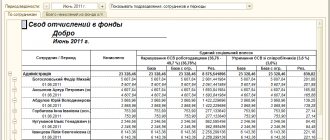What is special about the payroll section?
His managers pay for the mistakes of the accounting group accountant. Therefore, the peace of mind of the chief accountant and director of the organization depends on the professionalism of the accountant.
1C-WiseAdvice specialists have learned from the experience of many companies that correct and timely payroll increases employee loyalty. Frequent errors in calculations, on the contrary, can significantly reduce staff motivation.
The payroll accountant's competencies and skills must correspond to the company's profile. For example, the principles for calculating salaries for shift workers and employees of medical companies are different. This means that a payroll accountant must not only have general knowledge, but also understand industry intricacies and nuances.
Requirements
Accountants are hired for positions only if they have a higher education. Regular courses are not enough here. In addition, work experience in a similar position must be at least three years. An important point is the knowledge of a computer, standard and specialized programs, as well as office equipment.
Responsibilities of a payroll accountant must be listed on your resume. They should be listed as a separate item. It's important to take a little more time to list your strengths on your resume. This will help management make a positive decision when selecting a specialist. After all, it is in the resume that the existing abilities, abilities, and acquired skills are written down. It is important to indicate that you have the necessary knowledge of tax legislation, PBU and other regulatory documents.
https://youtu.be/v6Eup7NAOCo
What a payroll accountant should know: basic requirements
The quality of an accountant’s knowledge in the payroll area directly affects how the employee copes with job responsibilities. The decisions that a specialist makes in his current activities must be based on legal and industry regulations.
The main list of professional knowledge of a financial accountant:
- Understanding of legal payroll requirements. It is necessary to understand the peculiarities of calculating wages for employees working in various modes, be able to work with sick leave, take into account industry-specific legislative specifics and all the intricacies of settlements with personnel.
- Knowledge of the mechanisms for preparing tax reporting related to wages, compliance with deadlines for its submission.
- Application of formulas, methods and methods for checking the correctness of wage calculations.
- Understanding of document flow mechanisms, rules for archiving and storing documents in this area of accounting.
- Possession of information about how operations related to payroll are reflected in analytical and synthetic accounting accounts.
This is the minimum amount of knowledge. An accountant must not only possess them, but also be able to apply them in practice. A staff accountant often combines several areas of work, so he simply does not have time to comprehend any of the nuances of a particular specialization. This means that calculations are carried out in a primitive way.
In 1C-WiseAdvice, each employee has his own activity profile. Our clients know that their salary is calculated by a professional who takes into account all the industry intricacies of this process.
What it looks like in the chart of accounts
Russia25000—63000 RUR
Moscow40000—92000 ₽
To record calculations for remuneration of personnel, accounting account 70 is used - it summarizes the relevant information for each employee of the enterprise.
The debit of the account shows the amount of paid wages, as well as the amount of deductions (for taxes (account 68), for executive documents (account 76), shortages (account 73) and damage to valuables (account 94), etc.) . If an employee does not receive his accrued salary on time, then this amount is reflected in the debit of the account. 70 in correspondence with account. 76.
The loan displays:
- the amounts of accrued wages in correspondence with the accounts in which the corresponding costs are collected;
- amounts of accrued vacation pay in correspondence with the account. 96;
- accrued dividends to the company's employees in correspondence with the account. 84.
Enterprises must organize analytical accounting according to accounting 70 for each employee.
About the accounting register, which summarizes information about settlements with employees for wages, read the article “Features of the balance sheet for account 70.”
Accounting for wages and deductions from them should also clearly reflect the amount payable to employees. In this regard, accrued on the debit of the account. 70 wages will be reduced.
Personal income tax is necessarily withheld from the salaries of all employees - for this purpose, Dt 70 Kt 68 is posted.
Payment of wages (without personal income tax and deductions on writs of execution, etc.) is made through the cash register or by transferring funds to the employee’s card account. When issuing a salary account. 70 corresponds with account. 50 (51).
You can find out how salaries are transferred to a card in the article “Procedure for transferring salaries to a bank card.”
Let's immediately complete the task ourselves. I am sure you are already ready for its implementation. We talked so much about employees in the minimum theory section; we mentioned them in previous articles. I'm sure you can handle it. Write out accounting accounts or accounting sections that are associated with employees. If required, use the chart of accounts.
It's time to look into the settings of the chart of accounts for the 70th account. I present to your attention the settings for account 70 from the 1C Accounting 7.7 program and the option for setting up account 70 in the 1C Accounting 8.2 program.
Your task, as we already know how to do, is to write what the characteristics of the account tell you and what it means. Then, find differences in the characteristics and assume what this will affect in transactions, SALT and Balance Sheet.
Functions of a payroll accountant
The functional responsibilities of a payroll accountant depend on how accounting is organized in the organization. Sometimes such a specialist has to combine several areas or personnel records. 1C-WiseAdvice experts, while auditing companies, noticed a simple pattern. Highly specialized workers have a significant advantage. The wider the accountant’s functionality, the greater the likelihood of errors.
The required minimum skills that an accountant must have:
- Work with primary accounting documentation (orders, time sheets, etc.).
- Reflection of payroll transactions on the accounting accounts.
- Calculation of payments and deductions, calculation of taxes and contributions arising in the area associated with payroll calculation.
- Control over mutual settlements with personnel.
- Preparation of tax reports, monitoring compliance with deadlines and correctness of registration.
- Collection and analysis of information data at the request of company management.
- Assisting other employees in obtaining information or reference information about their wages and other accruals and deductions.
It is best to consolidate the skills and competencies of a specialist in the job description in the form of responsibilities. This will help the employee understand what the employer expects from him. And the company management will always have the opportunity to evaluate the professional qualifications of the accountant.
Job description
Payroll accountant
1. General Provisions
1.1. This instruction has been drawn up in accordance with the Decree of the Ministry of Labor of the Russian Federation dated August 21, 1998. No. 37 “Industry-wide qualification characteristics of positions of workers employed in enterprises, institutions and organizations.”
1.2. An accountant (payroll) belongs to the category of specialists.
1.3. This job description defines the functional duties, rights and responsibilities of an accountant (for payroll).
1.4. A person who has a secondary vocational (economic) education without requirements for work experience or special training according to an established program and work experience in accounting and control of at least 3 years is appointed to the position of accountant (payroll).
1.5. An accountant (for payroll) is appointed to the position and dismissed from the position upon the recommendation of the chief accountant in the manner established by the current labor legislation by order of the director of the technical school.
1.6. The accountant (payroll) reports directly to the chief accountant.
1.7.An accountant (for payroll) must know:
— legislative acts, regulations, orders, orders, guidelines, methodological and regulatory materials on the organization of accounting, in particular payroll accounting and reporting in this area;
— forms and methods of accounting in a technical school;
— plan and correspondence of accounts, in particular for payroll accounting;
— organization of document flow in this area of accounting;
— the procedure for documenting and reflecting in accounting accounts settlements with personnel when paying for labor;
— methods of economic analysis of the economic and financial activities of the technical school;
— rules for operating computer equipment;
— economics, labor organization and management;
— market methods of management;
— labor legislation;
1.8. Accountant (accounting for fixed assets and inventories)
its activities are guided by:
- The Constitution of the Russian Federation.
— Civil, labor, administrative codes of the Russian Federation.
— Rules and regulations of labor protection, safety and fire protection, sanitary and epidemiological rules and regulations.
— Charter and local legal acts of the technical school (including internal labor regulations, employment contract).
- this job description.
1.9. The accountant (payroll) independently organizes the work in accordance with the work plan of the structural unit.
1.10. In the event of the temporary absence of an accountant (for payroll), his duties are performed by a person appointed in the prescribed manner, who acquires the corresponding rights and is responsible for the proper performance of the duties assigned to him.
1.11. In the event of the temporary absence of an accountant from another department, the accountant (for payroll) shall replace him as best he can for similar operations.
2. Functions
2.1. Performs payroll work for college employees.
2.2. Prepares tax reporting data.
3. Job responsibilities
The accountant (payroll) performs the following duties:
3.1. Performs accounting work in accordance with the provisions of the current legislation of the Russian Federation.
3.2. Participates in the development and implementation of activities aimed at maintaining financial discipline and rational use of resources.
3.3. Receives and controls primary documentation in this area of accounting and prepares them for accounting processing.
3.4. Receives, analyzes and controls time sheets and prepares them for counting processing.
3.5. Accepts and monitors the correctness of registration of temporary disability certificates, nursing certificates and other documents confirming the employee’s right to absence from work, prepares them for counting processing, as well as for the preparation of financial statements.
3.6. Provides managers and other users of financial statements with comparable and reliable accounting information for the relevant area of accounting.
3.7. Prepares data on the relevant area of accounting for reporting, monitors the safety of accounting documents, draws them up in accordance with the established procedure for transfer to the archive.
3.8. Performs work on the formation, maintenance and storage of a database of accounting information, makes changes to reference and regulatory information used in data processing.
3.9. Calculates wages for technical school employees and monitors the expenditure of the wage fund.
3.10. Registers accounting entries and posts them to accounts.
3.11. Prepares periodic reporting on the unified social tax in a timely manner.
3.12. Maintains personal accounts, tax cards, payslips for each employee.
3.13. Issues certificates based on employee applications.
3.14. Prepares payroll lists for the bank.
3.15. Fulfills the requirements of the federal law “On Personal Data” and other regulatory legal acts of the Russian Federation, as well as internal regulations of the technical school regulating the issues of protecting the interests of personal data subjects, the procedure for processing and protecting personal data.
3.16. Prepares payment documents for wages and taxes.
3.17. Fulfills the requirements in accordance with the job description for labor protection.
3.18. Performs other assignments of the technical school management that are not included in this job description, but arise in connection with production needs.
4. Rights
An accountant (payroll) has the right:
4.1. Receive from technical school employees the information necessary to carry out their activities.
4.2. Demand that the management of the technical school provide assistance in the performance of their official duties.
4.3. Improve your skills.
4.4. Get acquainted with draft decisions of the technical school management concerning its activities;
4.5. Submit proposals on issues related to your activities for consideration by your immediate supervisor.
5. Responsibility
The accountant (payroll) is responsible for:
5.1. For improper performance or failure to fulfill one’s job duties as provided for in this job description - within the limits determined by the current labor legislation of the Russian Federation.
5.2. For offenses committed in the course of carrying out their activities - within the limits determined by the current administrative, criminal and civil legislation of the Russian Federation.
5.3. For causing material damage - within the limits determined by the current labor and civil legislation of the Russian Federation.
5.4. For violation of the requirements of the federal law “On Personal Data” and other regulatory legal acts of the Russian Federation, as well as internal regulations of the technical school regulating the issues of protecting the interests of personal data subjects, the procedure for processing and protecting personal data - within the limits established by the current legislation of the Russian Federation.
5.5. For failure to perform or improper performance of one’s functions and duties provided for by this job description, orders, instructions, instructions of the technical school management, not included in this job description, but arising in connection with production necessity and other offenses - in accordance with the current legislation of the Russian Federation: remark, reprimand, dismissal.
6. Interactions
Accountant (payroll):
6.1. Works according to a schedule based on a 40-hour work week and approved by the director of the technical school.
6.2. Independently plans his work for each academic year and half-year. The work plan is agreed upon with the chief accountant and approved by the director of the technical school no later than five days from the beginning of the planned period.
6.3. Receives from the chief accountant of the technical school information of a regulatory, organizational and methodological nature, gets acquainted with the relevant documents against receipt.
6.4. Systematically receives HR and financial documentation from HR department employees.
6.5. Twice every month he receives a time sheet for teachers and lecturers from the secretary of the educational department.
6.6. Systematically exchanges information on issues within its competence with deputy directors and employees of the technical school.
6.7. Maintains confidentiality.
Responsibilities of a Payroll Accountant
The job description (JD) of a payroll accountant should describe in detail all the responsibilities of the employee. Such a document allows you to avoid controversial issues and regulates the relationship between the specialist and the employer.
The accountant's responsibilities must include monitoring the primary documentation used in calculating wages and reflecting these transactions in the accounting accounts. The employee must prepare certificates in Form 2-NDFL, calculate social contributions, and generate reports. It would be useful to oblige the employee to improve his knowledge of labor legislation in the field of calculation and payment of benefits, and the provision of benefits to certain categories of employees.
The specificity of this area of work is that the accountant has access to a large amount of personal data of employees. Therefore, it is necessary to include in his job responsibilities a clause on compliance with legislation on the protection of personal data and confidential information.
Organization of payroll accounting at the enterprise
In order to organize labor and wage accounting at an enterprise, the accounting policy specifies what forms of primary documents will be used for this purpose.
At the same time, with the entry into force of the accounting law of December 6, 2011 No. 402-FZ, the use of unified forms ceased to be mandatory. But many accountants, when organizing salary accounting, give preference to the forms of primary documents approved by Goskomstat Resolution No. 1 of January 5, 2004. The primary documentation for accounting for the movement of personnel are orders (on hiring, dismissal, transfers, provision of paid leave, etc.) . For each hired employee, a personal card is created and a personal account is opened.
Data on accrued and paid salaries, amounts of deductions and deductions are entered into a personal account, which is opened, as a rule, for a year. Data is transferred to personal cards from time sheets, sick leave sheets, orders for piece work, orders (on making deductions or calculating bonuses), etc.
You can learn about the procedure for organizing primary accounting at an enterprise from the article “Procedure for organizing primary accounting.”
Accountant rights
There is always a section in the job description that is dedicated to the rights of the specialist who calculates payroll. They are mainly related to obtaining information and improving existing business processes at the site.
For example, an employee has the right to receive internal information, including that which has the status of a “trade secret,” if it is related to solving current problems.
An accountant can make decisions within the scope of his official authority, suggest ways to optimize work or improve the informatization of internal salary reporting.
Results
For accounting of personnel remuneration, account 70 is used. It summarizes information about accrued wages, deductions and amounts to be paid.
If you have any unresolved questions, you can find answers to them in ConsultantPlus. Full and free access to the system for 2 days.
Job description of a payroll accountant - sample 2020
1C-WiseAdvice experts recommend annually reviewing the provisions of job descriptions. Accounting and labor laws are highly variable. Functionality that was effective last year may change significantly next year.
Sample job description for a payroll accountant, current in 2020
It is important not only the correct content of the job description, but also its correct design. The organization must issue an order that puts the instruction into effect. One copy of the instructions is given to the employee against signature, the second remains in the employee’s personal file.
Responsibility for accounting errors
Legislative requirements regularly introduce adjustments to the job duties and scope of responsibility of specialists. The emergence of new special regimes, changes in wage conditions - all this often leads to errors or incorrect performance of duties by the employee. The result is fines, penalties, and inspections by regulatory authorities.
As a rule, in an organization, the liability of a full-time specialist is limited by labor legislation, and the main monetary and reputational losses are forced to be borne by the business owner or chief accountant. At 1C-WiseAdvice this problem is solved differently.
We fully compensate financial losses to outsourcing clients if they are caused by errors due to our fault. It is possible to receive a payment even for those who have already stopped working with us. The statute of limitations for compensation is 3 years from the date of submission of the last report.
Terms of service in 1C-WiseAdvice









